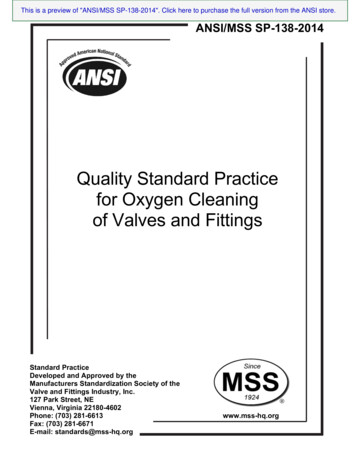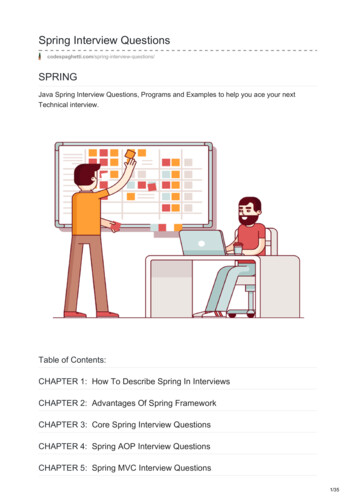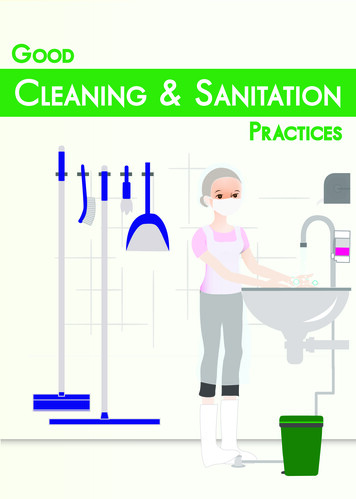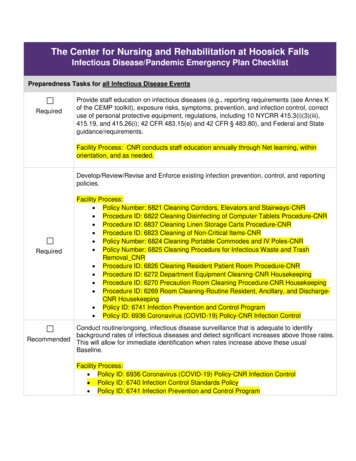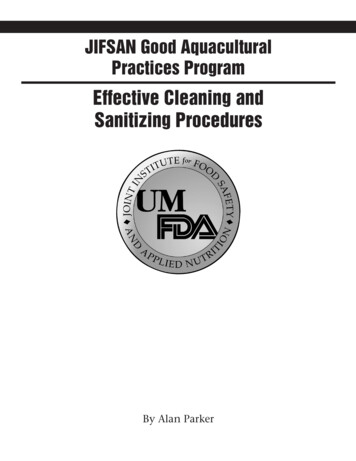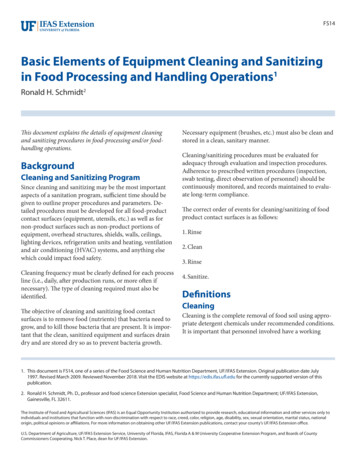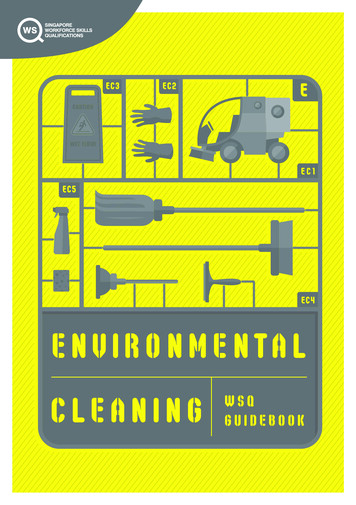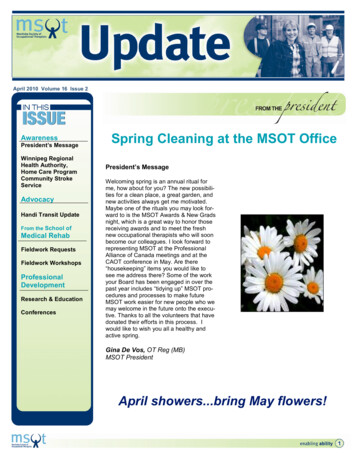
Transcription
April 2010 Volume 16 Issue 2AwarenessPresident’s MessageWinnipeg RegionalHealth Authority,Home Care ProgramCommunity StrokeServiceAdvocacyHandi Transit UpdateFrom the School ofMedical RehabFieldwork RequestsFieldwork WorkshopsProfessionalDevelopmentResearch & EducationConferencesSpring Cleaning at the MSOT OfficePresident’s MessageWelcoming spring is an annual ritual forme, how about for you? The new possibilities for a clean place, a great garden, andnew activities always get me motivated.Maybe one of the rituals you may look forward to is the MSOT Awards & New Gradsnight, which is a great way to honor thosereceiving awards and to meet the freshnew occupational therapists who will soonbecome our colleagues. I look forward torepresenting MSOT at the ProfessionalAlliance of Canada meetings and at theCAOT conference in May. Are there“housekeeping” items you would like tosee me address there? Some of the workyour Board has been engaged in over thepast year includes “tidying up” MSOT procedures and processes to make futureMSOT work easier for new people who wemay welcome in the future onto the executive. Thanks to all the volunteers that havedonated their efforts in this process. Iwould like to wish you all a healthy andactive spring.Gina De Vos, OT Reg (MB)MSOT PresidentApril showers.bring May flowers!
Winnipeg Regional Health Authority, Home Care ProgramCommunity Stroke Service“A client-centered approach to community re-engagement”UPDATE from MSOTRFother resources.The primary objectives of our service are to provide clients withcoordinated, efficient and timely access to client and familycentered stroke services, ideally, without gap in service fromThis column represents the first of a regular contribution fromthe MSOTRF committee to the MSOT Update in which we plan hospital discharge to start of therapy; ensure the client andto highlight Manitoba research, researchers, and opportunities. family are central participants when determining their careneeds and rehab goals; and, facilitating re-engagementWith the greatly successful Occupational Therapy Researchthrough interventions focused on helping clients participate inand Innovation Symposium in our recent past, our committeedecided that we would begin this series by highlighting some of desired activities and roles in their personally defined“community.” We help clients achieve potential recovery andthe research and innovative approaches that were shared atfunctional independence through both remedial and compenthe Symposium with the MSOT membership – particularly forthose of you who didn’t have the opportunity to join us in Octo- satory or adaptive treatment approaches. By facilitating recovery and functional independence we are also helping clientsber! Many thanks to Linda Merry Lambert of the Communityremain at home for as long as possible, and in some casesStroke Care Service for our first contribution.prevent premature institutionalization.Winnipeg Regional Health Authority, Home Care ProgramReferred clients may be seen by one, two or all rehab disciCommunity Stroke Care Serviceplines. Rehabilitation may consist of promoting independence“A Client-Centered Approach to Community Reand safety in ADL’s, IADL’s, swallowing/feeding, communicaEngagement”tion, or ambulation. Remedial interventions and compensatoryThis presentation aimed to describe a client-centered rehabili- strategies are used to address stroke-related impairments; forexample, constraint induced movement therapy programstation service for individuals who have suffered a stroke andadapted to a home setting to increase hand function, strengthwho benefit from ongoing rehabilitation following hospital discharge. The objectives of the presentation focused on: defining ening, balance and gait reeducation, stair management, community mobility, dysphagia management and remediation ofre-engagement, reinforcing that re-engagement is part of thevisual inattention or other cognitive deficits. Therapists mayrehabilitation continuum, highlighting relevant literature, deprovide one-on-one interventions and/or design, monitor andscribing how the Community Stroke Care Service (CSCS) faprogress treatment programs facilitated one to 5 times/week bycilitates re-engagement with our clients, sharing some of ourservice outcomes and discussing our future plans and evalua- the Rehab Assistants.tion for our service. For the purpose of this article, I will conSome examples of specific re-engagement outcomes we havecentrate on a short description of the CSCS.seen have ranged from improving someone’s independencewith showering, managing finances, medication management,The Community Stroke Care Service is a centralized HomeCare service for people who have recently suffered a stroke. It to being able to participate in building a deck, taking publicwas implemented in October 2005 and consists of case coordi- transportation, or returning to work.nation services both in hospital and in the community, rehabili- I am very proud to be part of such a nationally innovative program, which has just been identified as one of seven Leadingtation, home care supports and linkages to community rePractice areas in the WRHA following the recent WRHA acsources. The service currently accepts clients who are admitcreditation!ted and discharged from the Riverview Health Centre StrokeUnit. Clients have been assessed and are safe for dischargeLinda Merry Lambert OT Reg. (MB)home, and would benefit from additional stroke rehabilitationOccupational Therapistwhere the home and community setting is the most suitableCommunity Stroke Care Serviceenvironment to address client goals. Our team consists of aTeam Manager, 2 Case Coordinators, 1 Resource Coordinator, LMerryLambert@wrha.mb.ca1.5 OT’s, 0.5 PT, 0.5 SLP, 5 Rehab Assistants and access toJacquie Ripat2
Internet Café ColumnBy Fern SwedloveInternet Café will unfortunately not appear in this month’s newsletter. Please look forward to the columnin June 2010!Do you have a website that you refer to in your occupational therapy practice? If so, please feel free to email me thewebsite to share with your colleagues in the Internet Café column. You can contact me at fern.swedlove@gmail.com.Focus on Falls PreventionVision Screening Education SessionResearch has shown that diagnosing and treating visionproblems can reduce falls WHEN: Tuesday April 20th, 2010Wednesday May 19th, 2010TIME: 1300 till 1600WHERE: Misericordia AuditoriumWHO: Open to all levels of staff wishing to learn how toconduct vision screening as part of a falls prevention programCOST: FREE!Session covers: A summary of the vision research being done atMisericordia through the Focus on Falls Prevention Project How to perform a vision screening to identify visualloss that effect ADL functioning and falls risk A review of common ocular deficits in seniors andwhat can be done to change the environment to help withvision lossRegister with Karen McCormac at 788-8073 orkmccormac@misericordia.mb.caSave the DateDepartment of Occupational TherapySchool of Medical RehabilitationUniversity of ManitobaMASTER OF OCCUPATIONAL THERAPYINDEPENDENT STUDY SYMPOSIUMThe day will showcase student Independent Study projectsKeynote speaker TBAMonday, June 21, 20109:00 am to 4:30 pmA final symposium schedule will be posted in June2010 athttp://www.umanitoba.ca/medrehab/For more information contact Gayle Restall 975-77363
Handi-TransitUpdateFacts and Figures:Handi-Transit received over 3,000 applications in 2009 and had over 9,000 active registrants at the end of 2009In 2009, 71% of passengers carried were ambulant and 29% travelled in a wheelchairHandi-Transit carried 517,567 passengers in 2009Handi-Transit carried 43,538 passengers in February 2010Service Description and Eligibility Criteria:Handi-Transit is part of Winnipeg’s public transit system that accommodates people who have a physical disability thatsignificantly impairs their mobility so that they are unable to regularly use the City’s fixed route transit system. HandiTransit is a pre-booked, shared ride, door-to-door transportation service for applicants meeting the following criteria:Legally blindRequire full-time use of a wheelchairRequire transportation to and/or from dialysis only (able to use the fixed route service for all other travel)Have a physical disability that significantly impairs their mobility in that they cannot walk 175m/575ft (the typicaldistance between 2 bus stops) temporarily, during the winter, or permanently.Drivers physically assist passengers from the ground floor doorway of the pick-up location, to and from the vehicle, tothe ground floor doorway of the destination. This includes assistance up and down stairs at the ground floor doorway toa maximum of three stairs for someone travelling in a manual wheelchair.Application Process:The application is available at www.winnipegtransit.com under Handi-TransitApplications are reviewed in the order received by occupational therapists to determine eligibility. Short-term applications are typically processed within a few days unless there is a concern regarding the type or size of the applicant’smobility aid. Some typical examples of short-term applications are:Individuals determined to be palliativeHaving recently had a total knee or hip surgery (surgery dates must be provided)Many applicants are required to come in for an assessment as well. In many cases, eligibility may not be in questionwhen an assessment is requested. Assessments may be required in order to determine one, some or all of the following:EligibilityMobilityTransfer statusEquipment dimensions and modificationsEquipments compatibility with Handi-Transit vehiclesAn individual’s ability to travel independently on Handi-TransitShould an assessment be required, friends and family are welcome to attend. If a client has no other means of attending the assessment rides are available to and from the Handi-Transit office.Applicants who are determined ineligible for the service have an appeal right and can book an appeal hearing by callingHandi-Transit.Article is continued on page 544
Continued from page 4Equipment:Handi-Transit is currently able to carry the following wheelchairs:Side and rear-entry minivans: 30” in width from outside wheel to outside wheel, 48” in length, notexceeding 550lbs when the passenger is occupying the chair.Mini-buses (currently three in the fleet, increasing to five in 2011): 32” in width from outside wheelto outside wheel, exceeding 600lbs when the passenger is occupying the chair.Please note: Handi-Transit will no longer be carrying transport wheelchairs. Transport chairs make the occupant vulnerable in the event of a motor vehicle accident because they are lightweight, intended forindoor use, and not appropriate for vehicle transport while an occupant is sitting in the chair.Updates and Questions:Please visit our website at www.myride.winnipegtransit.com/en/handi-transit/ for the newest applicationform and information regarding Handi-Transit.Should you have additional questions or concerns please feel free to contact one of Handi-Transit’s threeoccupational therapists:Teresa Fricke: tfricke@winnipeg.caStefanie Turner: stefanieturner@winnipeg.caSheena Warkentin: swarkent@winnipeg.ca5
Do you know an outstanding OT?It is time to begin thinking about who to nominate for the MSOT Outstanding OT Award. This award has been established to honor an MSOT member who has made an outstanding contribution to the profession. Criteria for this awardinclude the following: The nominee most have made an outstanding contribution to the profession of OccupationalTherapy in one or more of the following areas:Clinical PracticeEducationResearchAdministrationPublic RelationsPoliticsProfessional Development Contributions must have had a significant impact on and have demonstrated marked benefits for the profession, forexample,PublicationsDevelopment, implementation and evaluation of new services and processesChange in the structure of clinical practice, education, or professional associationResearch which has had direct and specific effects on OT To nominate an Outstanding OT, please submit a nomination form to the Awards and Nominations Committee for consideration. Nomination forms may be picked up at the MSOT office or you can contact the Awards and NominationsCo-chairs.The deadline for nominations is April 1, 2010. Previous nominations will be considered every year, but the award willbe offered only when provincial recognition is merited.The outstanding OT award will be presented at the annual MSOT Awards and New Grads Reception in May 2010 andthe recipient will receive a complimentary ticket on behalf of MSOT.If you have any questions, please contact the Awards and Nominations Committee Co-Chairs, Jill Stuart-Edwards(479-3734) or Kellsey Scheepers (999-9268).6
MSOT AWARDSandNEW GRADSRECEPTIONThursday, May 13th, 2010Winnipeg Convention CentrePan Am Room – 2nd FloorDoors open at 6:30Presentations begin at 7:00 p.m.Wine & CheeseReceptionTickets: 15.00, New Grads: 5.00Call Jill Stuart-Edwards (479-3734) orKellsey Scheepers (999-9268)for more informationEvery year the Canadian Cancer Society, Manitoba Division, awards two recipients of theRobert A. Macbeth Traveling Fellowship with 3500 each.Robert A. MacbethTraveling FellowshipTwo fellowships of 3500 each will be awardedto health professionals in Manitoba who:Have completed a healthcare related undergraduate or graduate degree in an accrediteddegree program, either at the University of Manitoba, or an institution that offers accredited degree/diploma programs with a minimum GPA of3.5 (or equivalent);Have been accepted into the Faculty ofGraduate Studies program related to healthcare,in the field of oncology; or have been acceptedinto a program which provides additional trainingof specialized skills related to healthcare, in thefield of oncology.Preference will be given to an applicant employed in a position related to his/her undergraduate degree/diploma for a minimum of 3-5years at the time of application;Will be attending a training program that willcontribute to the study of cancer.The selection committee will be named by theCanadian Cancer Society, Manitoba Division.Applications will be notified regarding a selectiondate. Applications must be submitted to the Canadian Cancer Society, Manitoba Division in triplicate by may 28, 2010.If you have questions please contact:Sara Fleisher, MBA, HRMCanadian Cancer SocietyHuman Resource Consultant(p)831.72887
FIELDWORK 2010 – SPRING &SUMMERBy U of M OT Fieldwork TeamFIELDWORK REQUESTS:Our call for Advanced placement offers was distributed in January, 2010. This final placementfor our students runs for 6 weeks between June28th and September 10th, 2010.We hope you will start to think about this request, and consider adding your site and program to the Advanced Fieldwork Options. Weare still gratefully accepting Intermediate 1 offersfor our first year students in fieldwork May 3June 25th 2010.If you have thoughts or questions about thesepotential fieldwork opportunities please feel freeto contact your outreach developer or MargaretAnne Campbell, Academic Fieldwork Coordinator, at 789-3992 or campbe02@cc.umanitoba.caMore information is also available on our website: http://umanitoba.ca/medrehab/ot/ and follow the links to fieldwork.Fieldwork WorkshopsThe University of Manitoba - Department of Occupational Therapy offers workshops for occupational therapists within the province of Manitoba. It is our hope and intent that these workshops will support theoccupational therapy community in its commitment to educating futureoccupational therapists. These workshops are provided free ofcharge.Introduction to Fieldwork Education:This workshop focuses on facilitating the development of skills or abilities of fieldwork educators within the profession of Occupational Therapy. This full day workshop is recommended for clinicians who have noprevious experience as a fieldwork educator or for those who are interested in a refresher.**Each ½ day has a separate focus**:Morning: Introduction to the Structure and Process of Fieldwork SupervisionThis half day focuses on preparing for and completing the fieldworksupervision process from the decision to offer a placement through tothe end of the placement process. Work time is included for therapiststo develop placement objectives and plans.Afternoon: Adult Education and Fieldwork EvaluationThe workshop will review the concepts and application of Adult Education as it applies to the role of an educator within a fieldwork setting. We will also review the principles of evaluation as they apply tofieldwork education.**Educators can attend only part of the day if necessary. ****Please contact Margaret Anne if you are considering this. **Please note that these workshops may be made available via Telehealth.For workshop registration or Telehealth arrangements call Charlene at 789-3757 or contact her by e-mail: ckdyck@cc.umanitoba.caFor more information on these or other workshops contact:Ellen Davis: 480-1369; davise@cc.umanitoba.ccLisa Mendez: 977-5632; mendezl@cc.umanitoba.caMargaret Anne Campbell Rempel: 7893992; campbe02@cc.umanitoba.ca8
Conferences2nd National Conference on Positive AgingDate: Friday & Saturday, November26th & 27th, 2010 Location: The CoastPlaza Hotel and Suites,1763 ComoxStreet,Vancouver, BC Canada Theblock of room is Reserve today toavoid disappointment by calling tollfree: 1-800-716-6199The aim of the 2nd National Conference on Positive Aging is to bring together an interdisciplinary audience ofhealth professionals and researchersto address some of the issues andchallenges facing the aging populationtoday.Call for Posters: The InterdisciplinaryApproach to Positive Aging Conference provides an excellent forum forauthors to present their work in an interactive setting. Posters are ideal forpresenting scientifically based investigation, clinical case studies, and demCall for Abstracts: 11th Canadian onstration projects.Conference on Collaborative Men- The deadline for presentation submissions is March 26th, 2010tal Health Care The Call for Abstracts for the 2010 Canadian ConContact Infoference on Collaborative MentalHealth Care are to be held in Winni- Katia SelezenevaPhone: (604) 822-7524, Fax: (604)peg from May 13th- 15th is nowposted on the shared care website. 822-4835,Winnipeg is excited to host the 2010 Email: ipad@interchange.ubc.caConference, and planning is well un- Website: www.interprofessional.ubc.caderway. The theme of the conference will be "Keeping One StepAhead: Practical Approaches toMental Health Promotion".Collaborative Mental Health Carec/o 10 George Street, 3rd floor,Hamilton, ON L8P 1C8Tel: (905) t.caFamilies in Focus3rd Conference on Recent Advances in the Prevention andTreatment ofChildhood and Adolescent ObesityOctober 27 – 29, 2010Hamilton Convention Centre, Hamilton, ONSheraton Hamilton Hotel116 King Street West, Hamilton, ONL8P 4V3Phone: (905) 529-5515Contact InfoKatia SelezenevaPhone: (604) 822-7524, Fax: (604)822-4835,Email: al.ubc.ca9
Research & EducationEthics News – Spirituality and Ethics in HealthcareMark your calendars. Everyone is welcome to attendthe following Health Sciences Centre event.Topic: Spirituality and Ethics in Healthcare: A PanelDiscussion Exploring the Connections between Spirituality and EthicsPanelists:·Anne Marie Brown, Clinical Nurse Specialist,PsycHealth, Health Sciences Centre·Marie Edwards, PhD, Assistant Professor, Faculty of Nursing, University of Manitoba·Patricia Frain, Director, Spiritual Health Services, Health Sciences Centre·Dr. Merril Pauls, Director of Ethics & the Humanities, Faculty of Medicine, University of ManitobaDate: Wednesday, March 3, 2010Time: 1200-1300 hoursLocation: PX236-238 PsycHealth Building, 771 Bannatyne AvenueThis event is not available by MBTelehealth.For more information, contact Spiritual Health Services at 787-3884.Viola Leadlay Visiting Lecturer SeriesWRHA Regional Approach to Pain ControlMonday, April 12, 20100800-1600Frederick Gaspard Lecture Theatre (Theatre A) –Basic Medical Sciences Building730 William Ave.Registration fee: 20.00 includes lunchPLEASE PRINT & FORWARD ALONG WITHYOUR CHEQUE or MONEY ORDER (NO CASHOR CREDIT CARDS) TO:Louise ArmstrongOrganization & Staff DevelopmentNA636-700 McDermot Ave, Winnipeg, MBR3E 0T2NB: Please make cheques payable to the HealthSciences CentreNO REFUNDS WILL BE ISSUED AFTER MARCH26, 2010Riverview Rehabilitation Education SeriesSpring 2010Please visit the following website for additional information on theRiverview Rehabilitation Education Series Spring 2010, focusing onElder Care.Hosted by Riverview Health CentreTuesdays, 4:30 to 6:00 pm, Feb 23 to April 27, 2010For more info, call Education Services at 0
Cold Melon SoupPrep Time: 25 minutesIngredients:3 cups chopped cantaloupe2 tbsp sugar¼ cup orange juice3 cups chopped honeydew melon1/8 tsp salt Preparation:Place cantaloupe, half of the sugar and half of the orangejuice, and half of the salt in a blender container or foodprocessor bowl. Cover and blend until smooth. Transfer to amedium bowl, cover and chill. Repeat with honeydew melonand remaining sugar, orange juice, and salt. Chill in a separate bowl.When ready to serve, pour equal amounts of melon mixturecarefully into each individual bowl, pouring both at the sametime, keeping the melon mixtures as separate as possible.You'll have a two-color soup that is beautiful and delicious.Serves 4-6Employment AdvertisementsIn-Province:¼ page - 40.00/month½ page - 60.00/monthFull page - 80.00/monthCommercial AdvertisementsFull page 100.00/month½ page 80.00/month¼ page 60.00/monthBusiness Card 30.00/monthOut-of-Province:¼ page - 50.00/month½ page - 70.00/monthFull page - 90.00/month 570.00/year 450.00/year 330.00/year 150.00/yearDeadlinesSubmissions are required on the 10th of the month priorto the issue in which the material is to be published.11
kmccormac@misericordia.mb.ca Save the Date Department of Occupational Therapy School of Medical Rehabilitation University of Manitoba MASTER OF OCCUPATIONAL THER-APY INDEPENDENT STUDY SYMPOSIUM The day will showcase student Inde-pendent Study projects Keynote speaker TBA Monday, June 21, 2010 9:00 am to 4:30 pm



